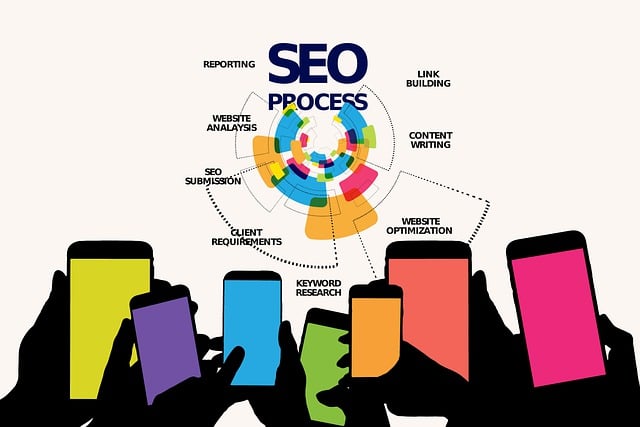By 2025, Artificial Intelligence (AI) will be at the forefront of Search Engine Optimization (SEO), revolutionizing digital marketing through advanced data analysis and user intent understanding. Natural Language Processing (NLP) will power semantic queries and personalized content, while Machine Learning (ML) algorithms will drive personalized experiences and improve key SEO metrics. Voice search optimization is a growing trend, requiring NLP-focused content creation. AI tools will automate keyword research, trend prediction, and long-tail discovery, but ethical considerations are vital to ensure fairness and user consent in this evolving landscape of SEO Trends 2025.
“Welcome to the cutting edge of search optimization, where Artificial Intelligence (AI) is reshaping the landscape of Search Engine Optimization (SEO) in 2025. This article explores the transformative power of AI in driving organic growth. From the historical evolution of AI in SEO to its current state, we delve into key trends such as Natural Language Processing (NLP) enhancing semantic search, machine learning algorithms personalizing content, and voice search optimization. Additionally, we examine ethical considerations while predicting future prospects for this dynamic duo—AI and SEO.”
The Evolution of AI in SEO: Past and Present

The evolution of AI in Search Engine Optimization (SEO) has been a transformative journey, shaping the digital marketing landscape over the years. In the past, AI was primarily used for basic keyword research and content optimization, offering valuable insights to marketers. However, with advancements in natural language processing and machine learning, AI’s role has become increasingly sophisticated. Today, AI-powered tools can analyze vast amounts of data, understand user intent, and provide nuanced insights into consumer behavior, making SEO strategies more effective.
As we move towards 2025, AI is set to play an even more pivotal role in defining SEO trends. Advanced algorithms will continue to refine search results, prioritizing content that aligns with user preferences and semantic queries. AI-driven analytics will enable marketers to predict search patterns, identify emerging keywords, and create tailored content strategies. This evolution promises to enhance the user experience, ensuring that search engines deliver relevant and high-quality information, thus fostering a more interactive and engaging digital environment.
Natural Language Processing (NLP): Unlocking Semantic Search

Natural Language Processing (NLP) is a game-changer in the realm of AI-powered SEO, especially as we look ahead to the trends shaping 2025. By understanding and interpreting human language, NLP enables search engines to delve deeper into the semantic meaning behind keywords, providing more accurate and contextually relevant results. This advancement is particularly significant as users become increasingly reliant on voice searches and natural language queries.
In the coming year, expect to see NLP play a pivotal role in enhancing user experiences. AI algorithms will be better equipped to analyze user intent, enabling search engines to deliver more personalized and precise suggestions. This evolution promises to revolutionize online searching, making it more intuitive and efficient for ‘folks’ navigating the digital landscape.
Machine Learning Algorithms for Personalized Content

As we move into 2025, Machine Learning (ML) algorithms are set to play a pivotal role in shaping SEO trends. These intelligent systems can analyze vast amounts of data and user behavior patterns to deliver highly personalized content experiences. By learning from user interactions, ML models predict preferences and tailor search results accordingly, ensuring that each user receives relevant and engaging content. This approach not only improves user satisfaction but also encourages longer session durations and higher engagement rates, which are key metrics for SEO success.
SEO professionals can leverage these trends by integrating ML into their content strategies. For instance, using ML to understand the context and intent behind search queries allows for more precise keyword targeting. Additionally, personalized content recommendations can significantly boost click-through rates and reduce bounce rates, contributing to improved search engine rankings in the coming year.
Voice Search Optimization: Rising Trend and Strategies

Voice Search Optimization is quickly becoming one of the most significant SEO trends in 2025, driven by the widespread adoption of smart speakers and digital assistants. As users increasingly rely on voice commands to find information, search engines are adapting their algorithms to prioritize content that can be accessed and interpreted through voice interactions. This shift demands a strategic approach for content creators and marketers.
To stay ahead in SEO trends 2025, optimizing for voice search involves using natural language processing (NLP) techniques. Creating content that answers specific user queries is key; this includes incorporating long-tail keywords and focusing on providing concise, accurate information. Additionally, structuring data with schema markup can help assistants understand the context better, thereby enhancing the quality of results returned in voice searches.
AI-Driven Data Analysis: Enhancing Keyword Research

In the evolving landscape of SEO Trends 2025, Artificial Intelligence (AI) is revolutionizing keyword research and analysis. AI-driven data analysis tools are becoming indispensable for marketers as they sift through vast amounts of information to uncover valuable insights. These advanced algorithms can process natural language and contextual data, enabling more precise keyword identification and selection. By understanding user intent and search patterns, AI enhances the accuracy and relevance of keywords, which is crucial for optimizing content strategy.
This technology offers several advantages, including automated trend prediction, competitive analysis, and long-tail keyword discovery. Marketers can leverage these capabilities to stay ahead in a dynamic digital environment. With AI, businesses can make data-driven decisions, ensuring their SEO strategies remain effective and relevant in the face of constant algorithm updates and evolving consumer behavior.
Ethical Considerations and the Future of AI in SEO

As AI continues to permeate various industries, including search engine optimization (SEO), it’s crucial to address the ethical considerations that come with this technological advancement. The future of AI in SEO promises significant improvements in content creation, keyword analysis, and user intent understanding. However, concerns around data privacy, algorithmic bias, and transparency are at the forefront of discussions. With the increasing reliance on AI tools, ensuring fair and unbiased results is essential to maintaining a healthy online environment. Developers and marketers must collaborate to create ethical guidelines that promote responsible use of AI in SEO practices, upholding principles of fairness, accuracy, and user consent.
Looking ahead to 2025, understanding these ethical implications will be vital for staying relevant in the ever-evolving SEO landscape. AI trends are expected to focus on enhancing natural language processing (NLP) capabilities, allowing search engines to better interpret human language nuances. This shift could significantly impact how content is optimized and ranked, emphasizing the need for marketers to adapt their strategies. By embracing ethical practices and keeping pace with these trends, businesses can harness the full potential of AI-powered SEO while upholding integrity in the digital space.
